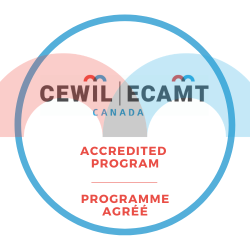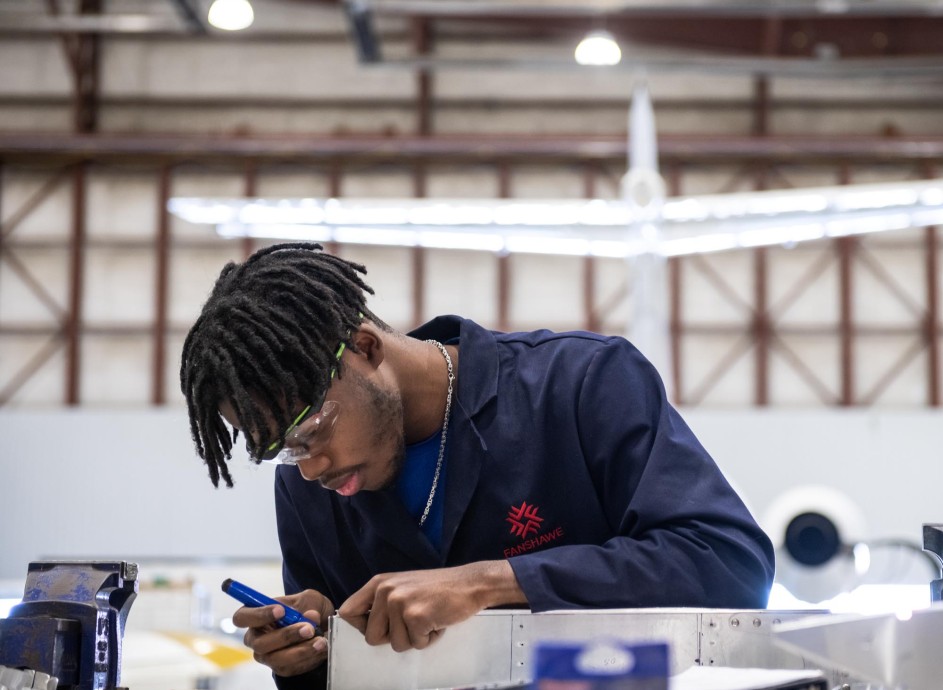
Program Overview
Program Details
Full Time Offerings
Full Time Offerings
Your Learning Experience
Aircraft safety is the most important aspect of the aviation industry. As an aviation technician, you’ll be responsible for ensuring that safety, which means you’ll be a valued and vital part of the maintenance team.
With the Transport Canada approved Aviation Technician – Aircraft Maintenance program, you’ll learn about all aspects of aircraft systems used in general aviation, corporate, charter transport category aircraft, and helicopters. Along with developing cutting-edge computer and electronic systems skills, you’ll also study propellers, aviation regulations, wing aerodynamics and more. As well, with aircraft constantly evolving and improving, you’ll have opportunities to adapt and upgrade your skills and your progress through the program, embarking on a life-long learning journey.
When you graduate, you’ll be prepared for a career with Canadian and international aircraft maintenance and aircraft manufacturing organizations. As well, you’ll be able to pursue your license in fixed wing or rotary wing aircraft in either the M1 or M2 categories.
The Aviation Technician - Aircraft Maintenance (Co-op) program is a Transport Canada approved program (TC-2013-08-4174) with a co-operative education component. This program provides the knowledge and skills required to start a career in fixed wing and helicopter maintenance. This program covers all aspects of aircraft maintenance; including systems used in general and corporate aviation, charter aviation, and transport category aircraft and helicopters.
NCMSTEP
This program is eligible for subsidized tuition for current and future members of the Canadian Armed Forces. Visit Fanshawe’s Military Connected Campus page to learn more.
Co-op Opportunities & Career Information
Co-op Opportunities
The Aircraft Maintenance program offers a cooperative education component, which provides students the opportunity to gain invaluable first-hand workplace experience within their chosen field. Here are some co-op jobs that have kick-started the careers of some Aircraft Maintenance students before even graduating!
Jazz Maintenance
Work with technical records, lease return, in-service engineering and technical service, component repair and line maintenance.
AME Avionic Apprentice
Inspect and maintain airworthiness standard, minor and major repairs on aircraft, refurbishments, planning and technical records.
Maintenance & Avionics Program YYZ & YHZ
Job shadow/work with a wide-range of departments, including technical records, lease return, in-service engineering, stores, component repair and maintenance quality.
For more information regarding co-op, please check out our co-op site or contact the Co-op Office at coop@fanshawec.ca to connect with a consultant.
Career Information
Fanshawe’s Aviation Technician – Aircraft Maintenance program prepares graduates for a career with Canadian and international aircraft maintenance and aircraft manufacturing organizations. Students who successfully meet the Transport Canada requirements will achieve 18 months of approved basic training credit towards the 48 months experience required to obtain a Transport Canada Aircraft Maintenance Engineer (AME) license, 'M' Category. Graduates will have the knowledge and experience to pursue their license in fixed wing or rotary wing aircraft in the M1 and M2 categories.
Did you know Fanshawe consistently ranks high in graduation employment rates among large colleges in Ontario?
Here are some examples of career opportunities for graduates of Fanshawe’s Aviation Technician – Aircraft Maintenance program:
Aircraft Maintenance Apprentice
Assist the maintenance and care of aircraft and their related systems. This can be with general aviation, corporate or transport category companies.
Airport Flight Line Technician
Assist in the maintenance and safe operation of a ground support equipment and municipal airport maintenance in accordance with government regulations, airport policies and procedures.
Aerospace Manufacturing
Work for various manufacturing companies such as engine, landing gear, aircraft systems and structure manufacturing. This can include field service and on aircraft diagnosis.
Program Progression
Fall intake:
Fall | Winter | Summer | |
| Year 1 | Level 1 | Level 2 | Work 1 |
| Year 2 | Level 3 | Level 4 | Work 2
|

Fanshawe did a really great job at preparing me for the industry by having great hands-on experience and awesome professors. The variety of aircraft Fanshawe has is a great way to learn different techniques on how to fix aircraft by providing all sorts of different scenarios and what you may encounter when you go out into the field.

This program is accredited by Co-operative Education and Work Integrated Learning Canada. This accreditation represents the highest standard of achievement for co-operative education programs in Canada, and recognizes Fanshawe's commitment to excellence.
Learning Outcomes
The graduate has reliably demonstrated the ability to
1. Inspect and service aircraft systems on large or small, fixed or rotary wing aircraft utilizing current and relevant theories of aerodynamics; aircraft; and mechanical, electrical, electronic, and engineering principles.
2. Inspect, test, troubleshoot, service, repair and overhaul aircraft in a manner that ensures adherence to Canadian aviation and company regulations of aircraft safety and airworthiness.
3. Evaluate fixed wing and rotary aircraft structures including transparencies, materials and fasteners, furnishings and fabric coverings, and lines and conduits, to complete maintenance, assembly, fabrication and repair work on large and small aircraft.
4. Perform scheduled and unscheduled inspections on aircraft systems, structures, instruments, and related components to ensure they are in proper working order and meet standards of performance and safety.
5. Install aircraft engines, parts, components and structures as part of routine and unscheduled maintenance and replacement tasks.
6. Diagnose malfunctions or other problems in aircraft systems, structures, instruments, and related components using technical manuals, drawings, blueprints, and standards of performance and safety.
7. Complete structural and non-structural repairs and modifications by following applicable procedures and safety precautions, and meeting industry standards.
8. Perform component wear and fatigue analysis using appropriate measuring devices to determine necessary repair or replacement tasks in order to maintain the aircraft’s airworthiness and safety.
9. Perform service, maintenance, repair, reconditioning, and modification procedures on aircraft systems, structures, instruments, and related components to maintain aircraft safety and airworthiness.
10. Dismantle airframes, aircraft engines and other systems for repair and overhaul.
11. Interpret written instructions, schematics, manufacturer's specifications, technical drawings, manuals, and computer based information correctly, effectively, and efficiently while performing routine and unscheduled tasks.
12. Maintain detailed inspection, repair, maintenance, and certification records and reports to meet industry regulations and logbook requirements.
13. Complete all work in a manner that enhances health, wellness, and personal wellbeing; reduces the risk of occupational and workplace injury; meets relation health, safety and environmental legislation; and conforms to occupational health and safety guidelines.
Academic School
Program Coordinator:
Tim Anderson
Admission Requirements
Competitive Programs
| This is a competitive program; the number of qualified applicants exceeds the number of seats available. Please see www.fanshawec.ca/hcp for details. |
International Admission Equivalencies
English Language Requirements
English Language Requirements
| Test | Score |
|---|---|
| TOEFL iBT | 79 |
| IELTS Academic | Overall score of 6.0 with no score less than 5.5 in any of the four bands |
| CAEL | Overall score of 60 with no score less than 50 in any of the four bands. score of 80 in listening |
| PTE Academic | 53 |
| Cambridge English | Overall score of 169 with no language skill less than 162 |
| ESL4/GAP5 | Minimum grade of 80% in Level 8, 75% in Level 9, or 70% in Level 10 |
| Duolingo | Overall score of 105, with no score lower than 95 |
Recommended Academic Preparation
Recommended Academic Preparation
- Grade 12 Transportation Technology (C)
- Grade 11 or Grade 12 Physics (C) or (U)
- It is recommended that students in the Academic and Career Entrance Certificate (ACE) program take a Technical or Apprenticeship Mathematics course within the ACE program.
Applicant Selection Criteria
Applicant Selection Criteria
Where the number of eligible applicants exceeds the available spaces in the program, the Applicant Selection Criteria will be:- Preference for Permanent Residents of Ontario
- Receipt of Application by February 1st (After this date, Fanshawe College will consider applicants on a first-come, first-served basis until the program is full)
- Achievement in the Admission Requirements
- Admission to the Fanshawe College Pre-Technology program does not guarantee admission in a subsequent year to the Aviation Technician – Aircraft Maintenance (Co-op) program. Successful completion of the Fanshawe College Pre-Technology program, however, does enable the student to be given additional consideration when applying to the Aviation Technician – Aircraft Maintenance (Co-op) program. The Pre-Technology program is the preferred designated preparatory program for admission to the Aviation Technician – Aircraft Maintenance (Co-op) program.
Courses
| Level 1 | ||||
| AVIA-1064 | Shop Safety & Aircraft Tools | 3 | ||
This course is an introduction to the Aircraft Maintenance Engineer (AME) category M license. It outlines the regulations, requirements and processes as well as the roles and responsibilities of the AME in the shop/hangar environment. The course also provides study of general tools and tools specific to aviation and how they are safely used on the materials of the aircraft industry. | ||||
| AVIA-1025 | Aircraft Corrosion Control | 3 | ||
This course is the study of the materials of modern aircraft and the processes involved in protecting them from their environment. | ||||
| AVIA-1050 | Fixed Wing Aerodynamics | 4.5 | ||
This course is the study of basic aerodynamic principles used in aircraft. It is designed for a full understanding of the devices and components used for aircraft control and flight performance. | ||||
| AVIA-1065 | Aircraft Reciprocating Engines | 6 | ||
This course is the comprehensive study of aircraft reciprocating engines and their systems. | ||||
| AVIA-1052 | Aircraft Propellers | 1.5 | ||
This course is the comprehensive study of aircraft propellers and their systems. | ||||
| AVIA-1030 | Aircraft DC Electrical Systems | 4.5 | ||
This course is a comprehensive introduction to basic electrical theory and components used in aircraft direct current (DC) systems. Students will gain a familiarity with electrical equipment construction and operation, and its application in industry. | ||||
| COOP-1020 | Co-operative Education Employment Prep | 1 | ||
This workshop will provide an overview of the Co-operative Education consultants and students' roles and responsibilities as well as the Co-operative Education Policy. It will provide students with employment preparatory skills specifically related to co-operative education work assignments and will prepare students for their work term. | ||||
| EDUC-1105 | Strategies for AME Communication | 3 | ||
This course is designed to support non-native speakers of English with the necessary language requirements to be successful in their Aircraft Maintenance Engineering programs (AAM4, AVI1, AVM4, and ASR1). Emphasis will be placed on sector-specific vocabulary acquisition, AME terminology and abbreviations, listening and reading comprehension, and effective communication skills, both oral and written. | ||||
Tuition Summary
London - Airport
*Total program costs are approximate, subject to change and do not include the health and dental plan fee, bus pass fee or program general expenses.






